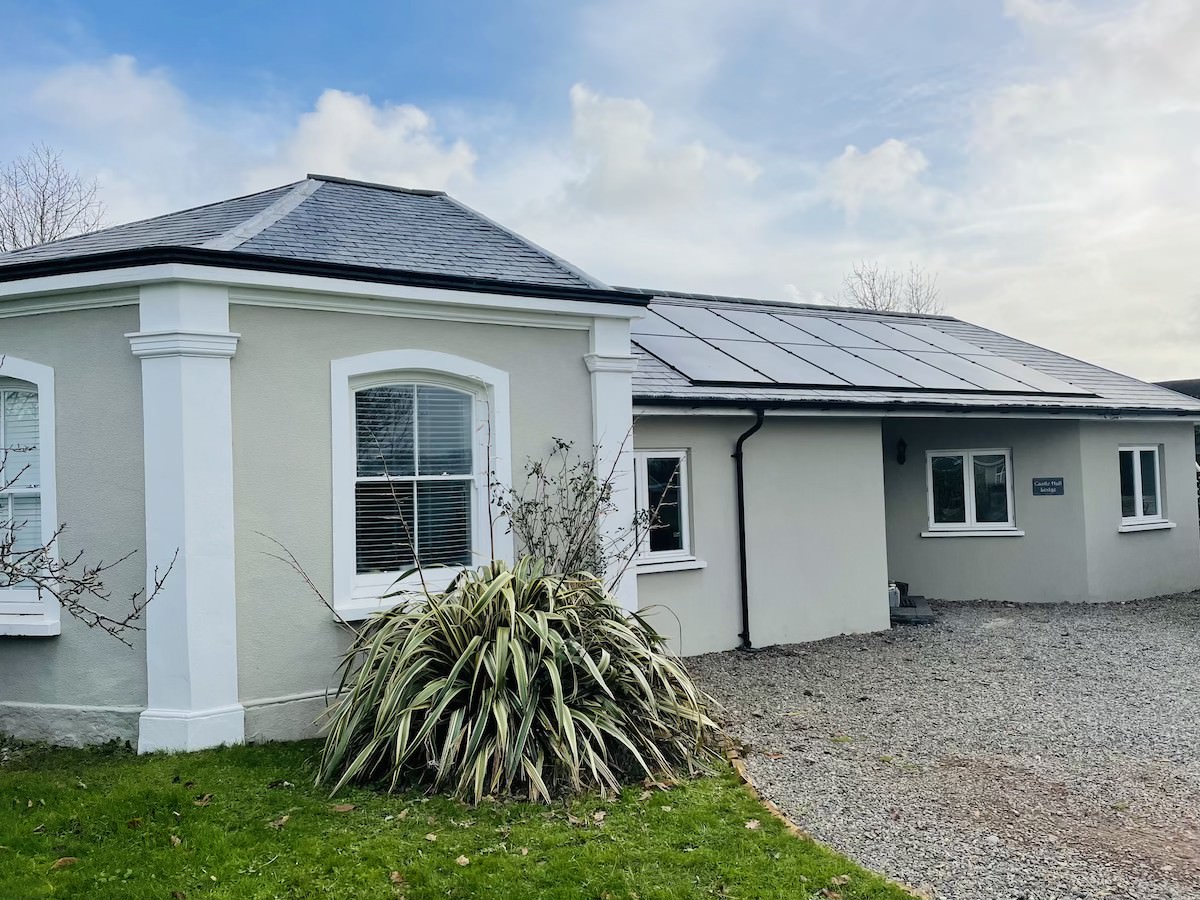

Frequently Asked Questions
Heat Pump FAQ’s
Will an air source heat pump work in my home? +
An air source heat pump will work in any home. The important question is how effective and efficient will that heat pump work. This is where using a reputable MCS accredited designer and installer of air and ground source heat pumps will be very important.
Green Warmth has been installing air and ground source heat pumps effectively since 2007. The design team takes into account a number of factors to understand each home’s construction, energy performance certificate (EPC) recommendations and location before accurately sizing the correct heat pump.
I have heard air source heat pumps are very noisy? +
Maybe the older ones were noisy! However, technology has moved on at a fast pace.
We can offer any customer to go and visit one that has been installed by the Green Warmth team. Customer feedback has all come back saying they were “amazed at how quiet they were, in fact birds generate more noise”!
What are the benefits of an air source heat pump? +
Not reliant on fossil fuels like oil and gas. Very self efficient when installed and sized correctly. Up to 600%+ efficient (1kW electricity in delivers 6kW out). If you have solar panels and a battery you can massively reduce your dependence on the electricity grid. They can heat your water as well as your underfloor or radiators. They can be retro fitted into homes with minimum disruption.
I have heard air source heat pumps are expensive to run? +
If the air and ground source heat pump is designed correctly then the heat pump will not be any more expensive to run than oil or LPG gas. They use more electricity in the winter (dependent on outside air temperature). However, over 12 months our data shows some great efficiency performances. It is also important to note that each heat pump manufacturer delivers different efficiencies at different temperatures.
Do I need a well insulated property to install an air source heat pump? +
The better the insulation within the property the better the heat retention, this is exactly the same whether you have oil or gas. Your EPC should give us a good idea of how your home is constructed and any recommendations required.
There may be shortfalls in your radiator requirements which would be highlighted within our full design site survey. It is not always necessary to upgrade your radiators. This can be discussed with our design team.
How do Green Warmth determine what air source heat pump is correct for my property? +
We will conduct a heat loss calculation, and conduct a full design site survey which will help advise which heat pump will best suit your home. if you decided after a budget quotation that you wish to proceed to a full design.
Green Warmth is fully MCS accredited for design and install. As such, we have annual audits and inspections to ensure we design a renewable system that will keep you warm and be efficient.
Can air source heat pumps also heat my hot water? +
Yes they can. If you have an immersion and solar PV you could also divert any excess solar to heat your water tank!
Is planning required for air source heat pumps? +
Only if it’s a listed building or conservation area /parks.
What air source heat pump manufacturers do Green Warmth use and why? +
Stiebel, Mitsibushi, Panasonic and Viessmann.
As premium supplies of Stiebel and Mitsubishi we have the added benefit of an extended warranty and easy access to technical support and parts.
What are more efficient ground source or air source heat pumps? +
Ground Source, however the new air source heat pumps coming out are still over 500% efficient from our latest data via servicing.
What space do I need to install a ground source heat pump? +
2m by 2m squared for the plant room kit. The ground area for piping would need to be roughly 2.5 x the floor area of your home. However, this can be determined by the Green Warmth design team.
How big are the cylinders, do I have enough space for the equipment? +
This depends on which cylinder the MCS design recommends for your home. Typically you need 1.5m for a cylinder. We have got the option of slimline cylinders for tighter spaces.
What electrical upgrades would I need to install an air or ground source heat pump? +
The electrical work required to install both ground and air source heat pumps is quite extensive. This normally involves adding external electric supplies and a new consumer unit to your existing home.
Green Warmth has internal electricians that can quote for this work or support your electrician with schematics and advice.
I have heard that air source heat pumps require massive radiators. Is this true? +
We heard this when we Google!! Radiators come in all shapes, sizes and have different heat outputs. Some a single convector, some double some triple!
It is true that heat pumps run at a different flow temperature to traditional oil and gas boilers, as such having a larger heat surface area would support but, the radiators will heat up just as hot as your current setup.
What happens if my heat pump goes faulty? +
Depending on what the fault is we can sometimes resolve this over the phone. Alternatively, we would send an engineer out to investigate this to try and diagnose the problem.
How long has Green Warmth been installing heat pumps? +
2007.
Solar PV FAQ’s
Do I need a South facing roof to have solar PV? +
South would usually be the best option however you can put panels on the East/West. South will give you a higher generation curve in the middle of the day, while East/West will give you a longer flatter curve. East will catch the early morning sun, while West captures the evening sun (especially in Summer time).
How many panels do I need to save on my electricity bills? +
This will depend on your annual usage and roof space. Green Warmth will gather information via a site survey, measure your roof area and provide a detailed solar PV report showing what your potential solar generation would be versus your monthly consumption. This would then provide you with a self-consumption %.
What is the difference between a string system and an optimized system? +
A string system is only as efficient as the worst performing panel. An optimised system allows each panel to work independently. The optimised system is more beneficial in shading. The optimisers also give you slightly more generation per panel and an individual panel reading.
There are so many manufacturers, how do I know which is the best system for my home? +
Green Warmth only installs MCS certified solar renewable equipment. The equipment comes with warranties of up to 15 years with options to extend.
How much roof space do I need for solar panels? +
Solar panels now tend to have a larger watt output per panel (385w+) as such these are slightly larger than panels from years ago. This will allow you to maximize small roof spaces
Do I need a new electric consumer unit to have solar PV? +
In many cases you may have some spare MCB ways within your current board that can be utilized. If not, Green Warmth can quote and install a new mini consumer unit at the time of installation.
How do I know Green Warmth is the right company to fit my solar panels and battery? +
Family run, trustworthy, reliable local company. Green Warmth have been installing solar panels for over 15 years and are Wales’ longest MCS accredited renewable company.
Do I need National Grid approval to install Solar panels? +
If the solar PV Inverter is above 3.68kW then Green Warmth will apply for National Grid approval on your behalf.
I am thinking about getting an electric car, can the panels charge the car? +
Yes they can, as long as the EV charger you install has that capability. Green Warmth can advise on which EV chargers are suitable.
How can I monitor what my solar panels are delivering? +
Solar edge app on phone/ipad/laptop can give you up to date real time information on production, battery usage, consumption as long as you have a Modbus fitted.
What happens if our solar panels go faulty? +
Very rarely this happens as there are not many moving parts. However, Green Warmth will come and investigate and resolve the issue. Green Warmth also provide a 2 year workmanship warranty to give you peace of mind.
Battery FAQ’s
Are battery storage systems worth it? +
If you are exporting excess back to the grid then yes. The excess solar generated would store and be used overnight which stops you then buying electricity in.
When Green Warmth designs a solar and battery system we want to ensure you are maximizing your self-consumption to ensure a quick return on investment.
How long will my battery storage last? +
It is still fairly new technology however, the manufacturer’s warranty is 10 years.
How big are the batteries Green Warmth install? +
Varying sizes, but no bigger than 250mm depth, 700mm width and 1200mm high
They are heavy though!
What batteries do Green Warmth install and why? +
We like to install SolarEdge Home batteries which start at 9.7kW. You can also add to this system with another 2 x batteries giving you 29.1kW of storage capability on 1 x inverter.
SolarEdge also has an excellent app which allows you up to date monitoring of what your system is generating (see case studies for more information).
Are Green Warmth fully qualified to install battery systems? +
Yes, Green Warmth has our own in-house BPEC qualified Solar PV and Battery electricians which allows us to MCS accredit your system and sign off.
How many batteries do I need? +
This will depend completely on what electricity you use and when you use it. Sometimes having more than 1 battery is a waste of money.
Our design team will discuss with you via a site survey and design report what they would advise and why.
How many panels do I need to run my battery system? +
Ideally we would say 8 or more. Panels are increasing in watt output so 8 x panels at 405w would generate 3.24kW of solar. The 3kW inverter would still charge and discharge to 3kW (max being 5kW).
I have heard batteries are coming down in price, is it best to wait? +
So did we, so we said wait and then the supply and demand went crazy and prices increased by over 25% in 2022. The prices have settled down more in 2023 however we are still seeing material costs increase.
If the design tool recommends a battery it is more cost efficient to do the install at the same time to save costs and to benefit from 0% VAT.
Will batteries work with any solar panels? +
Yes.
What is the difference between an AC coupled battery and DC coupled battery? +
The key distinction between an AC-coupled and DC-coupled battery systems lies in the journey the electricity takes once generated from the solar panels. As solar panels generate DC electricity, it must transform into AC electricity in order to power your home’s appliances. However, solar batteries store electricity in DC form.
As the current is only inverted once, DC coupled systems are up to 3% more efficient than AC battery systems. Making your entire PV system more economical. More Power. A DC coupled battery system allows for oversizing. Oversizing occurs when the amount of solar energy produced is greater than the system’s inverter rating.
Can the batteries Green Warmth install provide electricity to my home in the event the grid goes down? +
Yes we can
